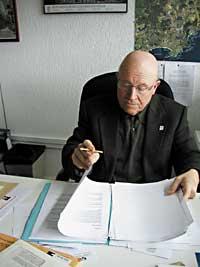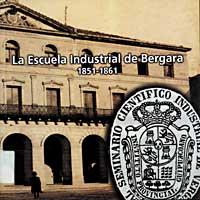José Llombart: "All races should have a history subject"

The history of science is a very didactic resource for those who have to work in teaching. However, this resource is not very used, especially because the teachers have not had much contact with history. In undergraduate programs there is usually no room for history or it is very small.
One of our objectives is to solve it. Currently there is in our faculty a subject called History of Science and Technology. I am. It is an optional subject for students of Physics. And in addition, we offer it as a free choice credit for any university student. This is the first step to take.
Is it a favourite subject for students?It has not had bad reception, it has remained at least. Optional subjects disappear if they do not have students, but this has been maintained. The first year we offered we had a single student, the second fifteen, the third twenty-two and this is the fourth year.
It must be taken into account, on the one hand, that there are few students of Physics and, on the other, that the system of self-examination has caused additional problems. I have not discouraged, but I think it should have a better welcome, especially because we give the subject from a general point of view of dissemination.
The history itself provokes a great passion in some and g or broken in others.
Yes, that's true. Sometimes it produces a great passion, but when hatred occurs it is brutal. The opposite stance is evident among those who do not like it. And so it has been difficult to introduce this subject in the program of this faculty. It has been achieved after several attempts by people for between twelve and thirteen years. But this subject is not enough. In addition, all races should have a history subject, that is, the chemists a History of Chemistry, the physicists a History of Physics, etc.
I, for example, have organized for about seven years a series of lectures on the history of science, which has also served me to prepare the subject and which have had very good reception. Perhaps it is also a matter of advertising, because marketing became good, but the truth is that the rooms were filled.
Are you alone in this?No. Within the Faculty of Sciences I am the only one of the group, but I have team-mates at the Faculty of Medicine. In fact, the history of medicine has more tradition than that of general science. It is an ancestral issue; doctors and pharmacists have a tradition older than us.
Therefore, you will have relationship with the Museum of Medicine of Leioa.
Yes. For example, the director of the museum Antonio Erkoreka belongs to our department, that is, he is professor of the same, he is professor of History of Science. Now we are three full professors, two at the Faculty of Medicine and I at the Faculty of Sciences.
It is surprising to have a museum within the university.Especially a museum of that quality. The museum is good and I don't say it alone, many Spanish experts too. For example, the XIX. They have one of the best collections of microscopes throughout the state of the end of the century. This is the specialty of this museum. In my opinion, this data is significant.
Returning to your department's accounts, what are your main lines of research?Our main line of research is the history of science in Spain and especially of science in the Basque Country. On the one hand, the XIX. We are investigating the scientific journalism of the first half of the twentieth and twentieth century. To do this, we analyzed journals that published scientific and technical topics.
On the other hand, XVII. XVIII. XIX. and XX. We investigated how knowledge of science came to Spain for centuries, how it spread in institutions, and how it was taught. Within this project, for example, we studied the expansion of atomic theory and made a thesis on this subject. In this thesis, we analyze, among other things, how this theory has been reflected in the curricula. In some subjects it has been incorporated and maintained to date, in others the same subject has been suspended. All this has been investigated. In addition, we have analyzed the text books that have been left to give these subjects.

Finding this material is an important part of our research. On the one hand, we have available traditional sources, such as traditional book catalogs. But, on the other hand, it is the Internet itself that has revolutionized the most. Through the network you can access funds from different libraries and once localized you can apply for a copy or loan of the book.
What are those libraries?In general they are university and public libraries. For example, we turn to the National Library of Madrid. Also to the libraries of the Diputaciones Forales, very suitable for the investigation of Basque topics. On the other hand, in the State there are very interesting libraries to investigate certain topics or times. For example, the XVII. To access the material of the twentieth or previous century, you have to go to the archive of Simancas, in Valladolid. And the follow-up of a given person can be done through the documents of the General Archive of the Civil Administration of the State, which is located in Alcala de Henares.
As we go back in time it will be more difficult.In fact, XVI. The material of the twentieth century is very scarce. Most of our works go back to the XVII. We manufacture them with material from the twentieth century. And we have researched many topics on the XVII.
That time, the time of King Charles III, will be prosperous for you, right?
Yes. In addition, the chairs of Chemistry and Mineralogy were created in the Euskal Herria, Bergara. In fact, there appears the case of the Elhuyar brothers, who isolated the wolfram in the center of Bergara. This center was of reference in Spain in the XVIII. In the eighteenth century it was the first. It also had the rank of other European centres. The Basque Country has a little known scientific heritage.
And another related theme is the XIX. subordinate: Industrial school of Bergara of the years 1851-1861. Only in that decade it worked and was closed for lack of money along with other industrial schools. We publish a book on this story, at the request of the Official College of Industrial Engineers of Gipuzkoa, to commemorate the 150th anniversary.
Therefore, we have done some research and work. And it seems important for people to know that here, too, research of this kind is carried out; that there is a group that studies the history of science, even if it is within a department that does not correspond to it.
Buletina
Bidali zure helbide elektronikoa eta jaso asteroko buletina zure sarrera-ontzian











